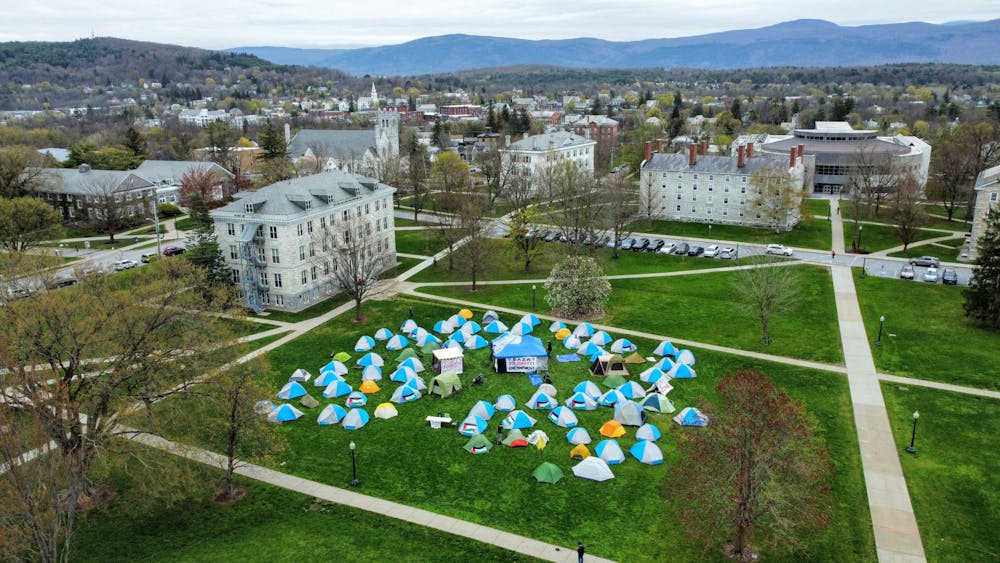A bubble of frustration and grief among the student body burst when the Middlebury Gaza Solidarity Encampment began on Sunday, April 28. The momentum grew as many students felt that the ongoing genocide in Gaza — with 35,000 dead, 8,000 missing, and 7,000 injured has been swept under the rug on the Middlebury campus, waiting for disruption to stir the status quo.
The student group gathered on the Quad features a diverse array of cultural backgrounds protesting for the groups demands. Despite recent coverage by Fox News which suggests otherwise, Jewish voices are integral to and embraced in the collective gathered at the encampment. At the Monday “Zionist Co-opting of Judaism” workshop, a diverse range of Jewish student voices were at the center of the conversation.
“This is a really human space; there is no knowledge barrier to engage,” one Jewish student said. “We’re not trying to exclude people. I’ve felt so alone on this campus since October 7th. In three days, this encampment has eliminated that feeling.”
At around 7:30 p.m. on Monday, students at the encampment observing Passover celebrated the final night through singing and sharing matza, charoset, and macaroons. At 8 p.m., there was the daily Maghrib Prayer.
Before Sunday, we were carefully considering the risks of joining the encampment due to the militant police crackdowns on college campuses across the country. Seventy-nine students have been arrested at the University of Texas, Austin and the administration has begun to threaten expulsion at Columbia following several suspensions.
However, our fear proved temporary as we witnessed the sheer organizational power of the Middlebury student body outraged with American complicity in Israeli crimes against humanity. This community has continually filled daily roles to aid one another and poured passion and knowledge into the educational efforts. We realized that this encampment and its community were worth more — and had taught me more — than the day of classes we had missed.
Since tents have been set up, a plethora of students, faculty, staff and community members focused on the genocide have streamed into the encampment, offering their support by bringing food, blankets, and charging devices.
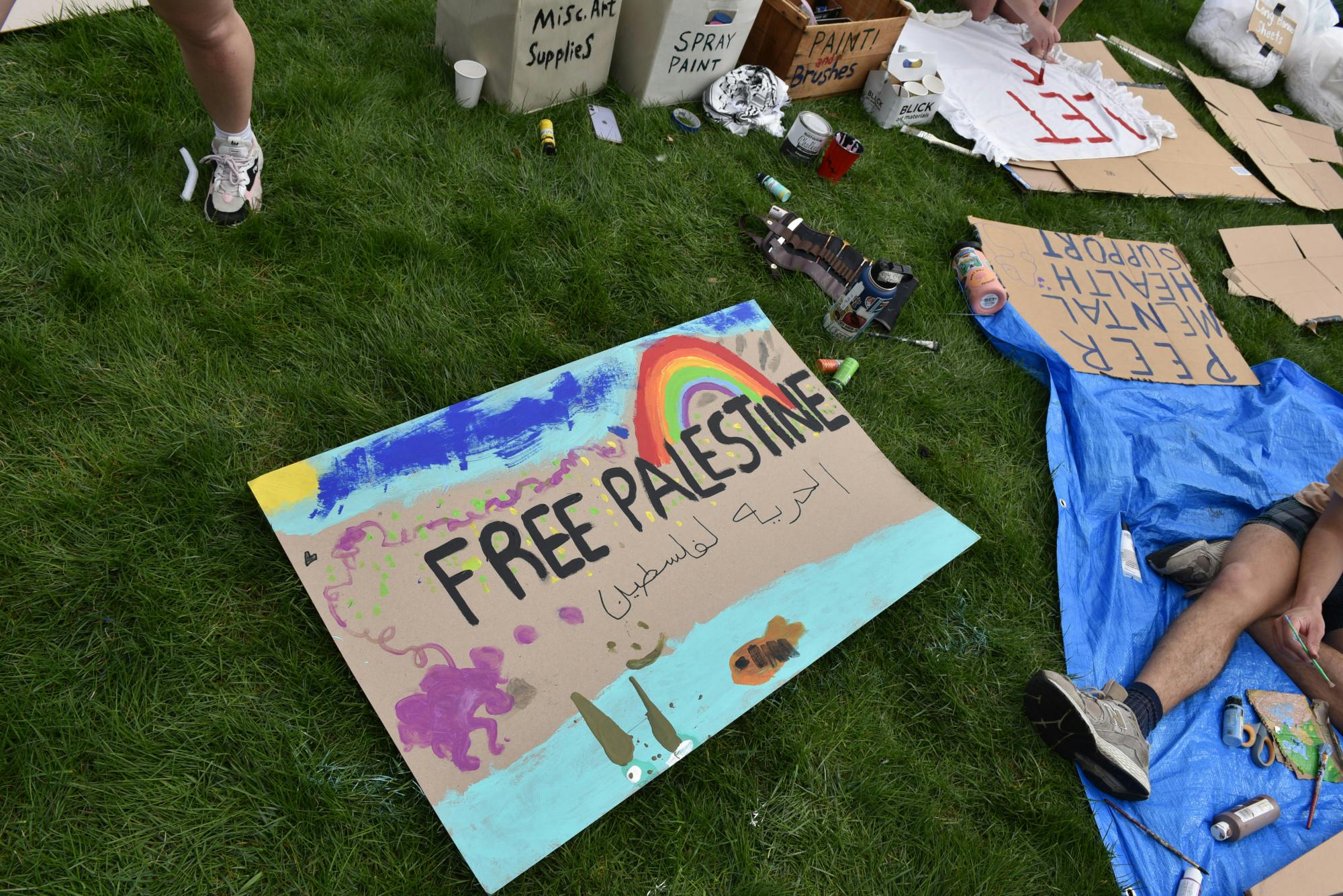
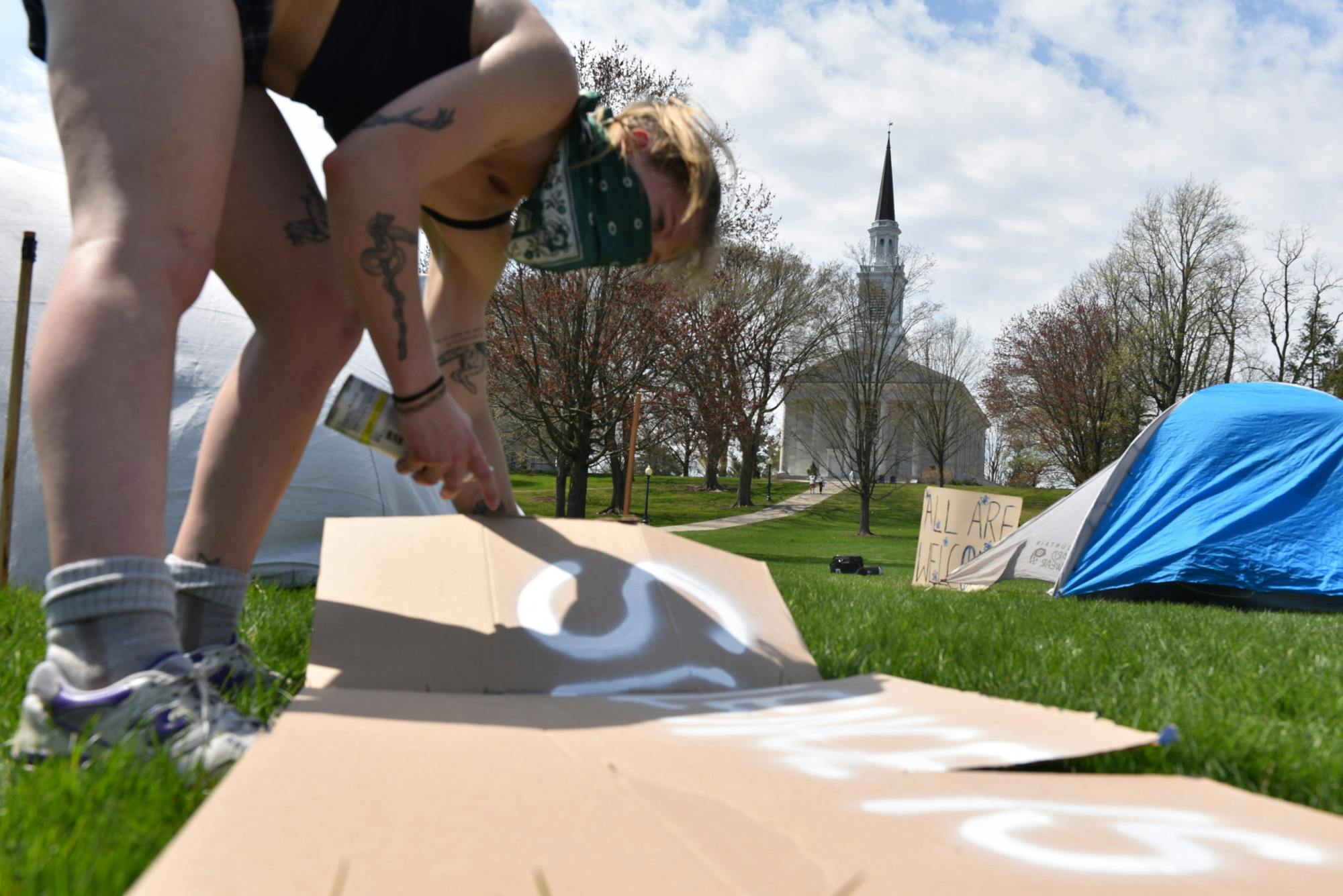
On day two, a group of us were tasked to create banners for a “People’s University,” canopy in the encampment designated for hosting class and club meetings. Throughout the rest of the day, both a class and the SGA Environmental Sustainability group leaders’ meeting were held there. Even more exciting than that is knowing several more classes and departments will be holding meetings here in the coming days.
On the third day of the encampment, over 90 people huddled under the central tent to listen to a “Palestine and The Environment Workshop” led by a staff member and a faculty member. They shared student writing, poetry, and a message from a staff member who could not be present out of fear of retaliation. The people leading the workshop discussed greenwashing and ecocide and how it pertains to the genocide in Gaza, where the destruction of food and water infrastructure has been a strategy utilized by the Israel Defense Forces (IDF).
This workshop exemplified the type of intersectional learning of that under the current college administration, cannot be implemented in a formal curriculum due to the administration’s both-sides-ism on the genocide. Especially at Middlebury, a leading institution for environmental studies with a major specifically devoted to Environmental Justice, uncensored, relevant education is imperative.
“There is no climate justice without Palestinian justice,” attendees chanted repeatedly at the end of the workshop.
One student remarked on the unique strength of this encampment through its communal learning opportunities.
“That's one of the most important drawing points, because there are a lot of educational opportunities here which help the people who feel like they can’t join because they think they don’t know enough about the conflict to be able to participate or take a stand,” the student said.
Each time we looked around the camp and saw the expanding perimeter and new faces, whether campers or attendees of daily events, we were filled with a new sense of empowerment. We began with 35 tents on Sunday. By Wednesday, there were over 80 filled tents. It was an exhibit of real, tangible, community-based political action on this campus. Windsor Smith ’24.5 remarked on the political culture of the Middlebury encampment.
“I've never really been one to experience school spirit, but I have never had such pride in our community as I have right now,” Smith said. “Having the tent camp expand every day just illustrates no matter what people's personal reasons are for being here, they're willing to be bodies on the ground for an indescribably important cause.”
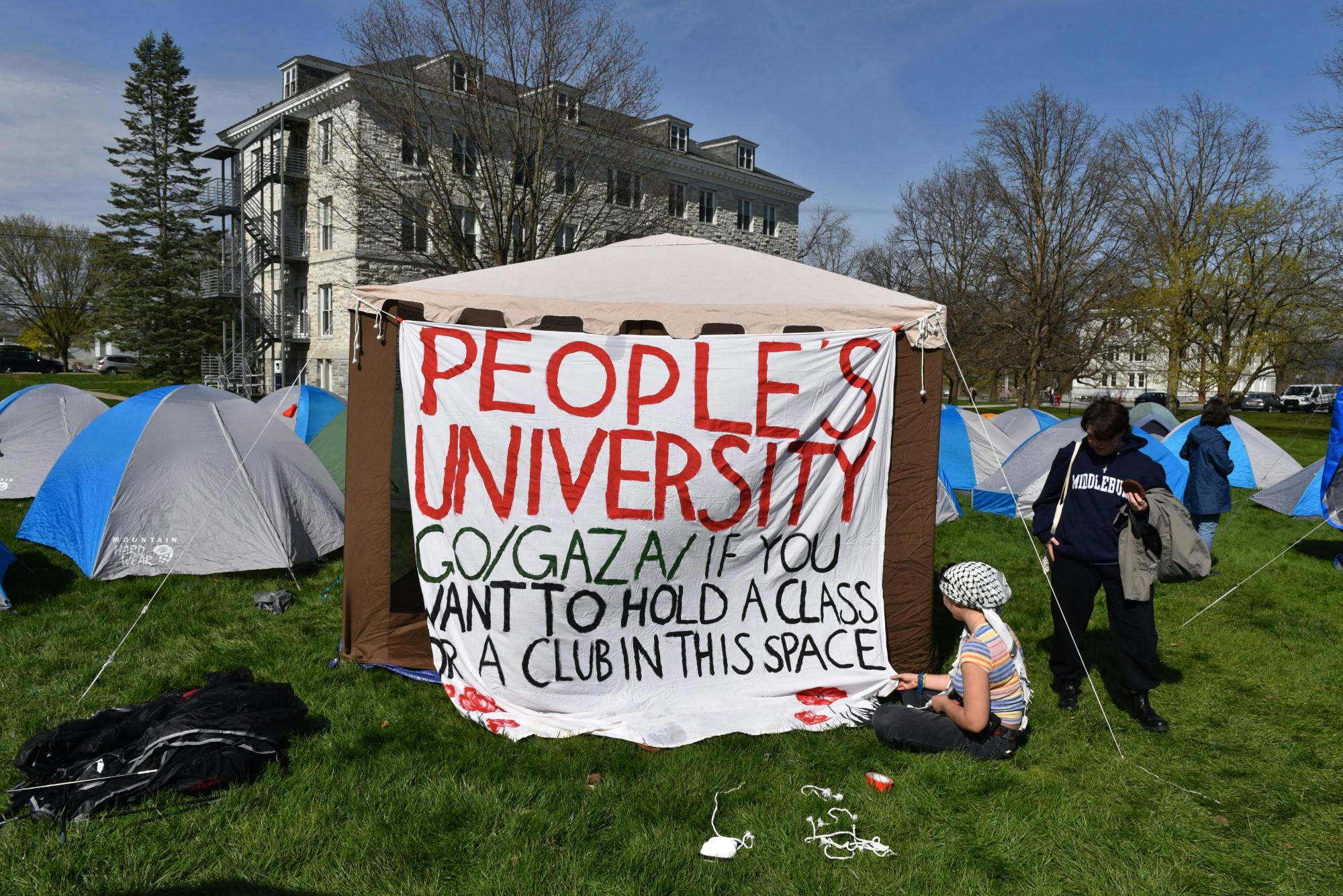
Despite the sense of community cultivated within the area, Smith also noted that many students who pass by the political action avoid eye contact.
“Even from people very close to me, who I know have good hearts, I hear an overwhelming narrative about not having time to engage in something like this. But the reality is, we are already out of time. We, as a global community. All almost 35,000 people who are dead are out of time. And I'm willing to sacrifice [an] essay or two to have my voice heard on that subject.”
The sacrifices students have made to organize the encampment drive the movement on our campus to remove this institution’s complicity in genocide, but are still meager compared to the livelihoods and lives lost in Gaza. A liberal arts education would mean nothing if it is not applied to resist ethnic cleansing happening in real-time.
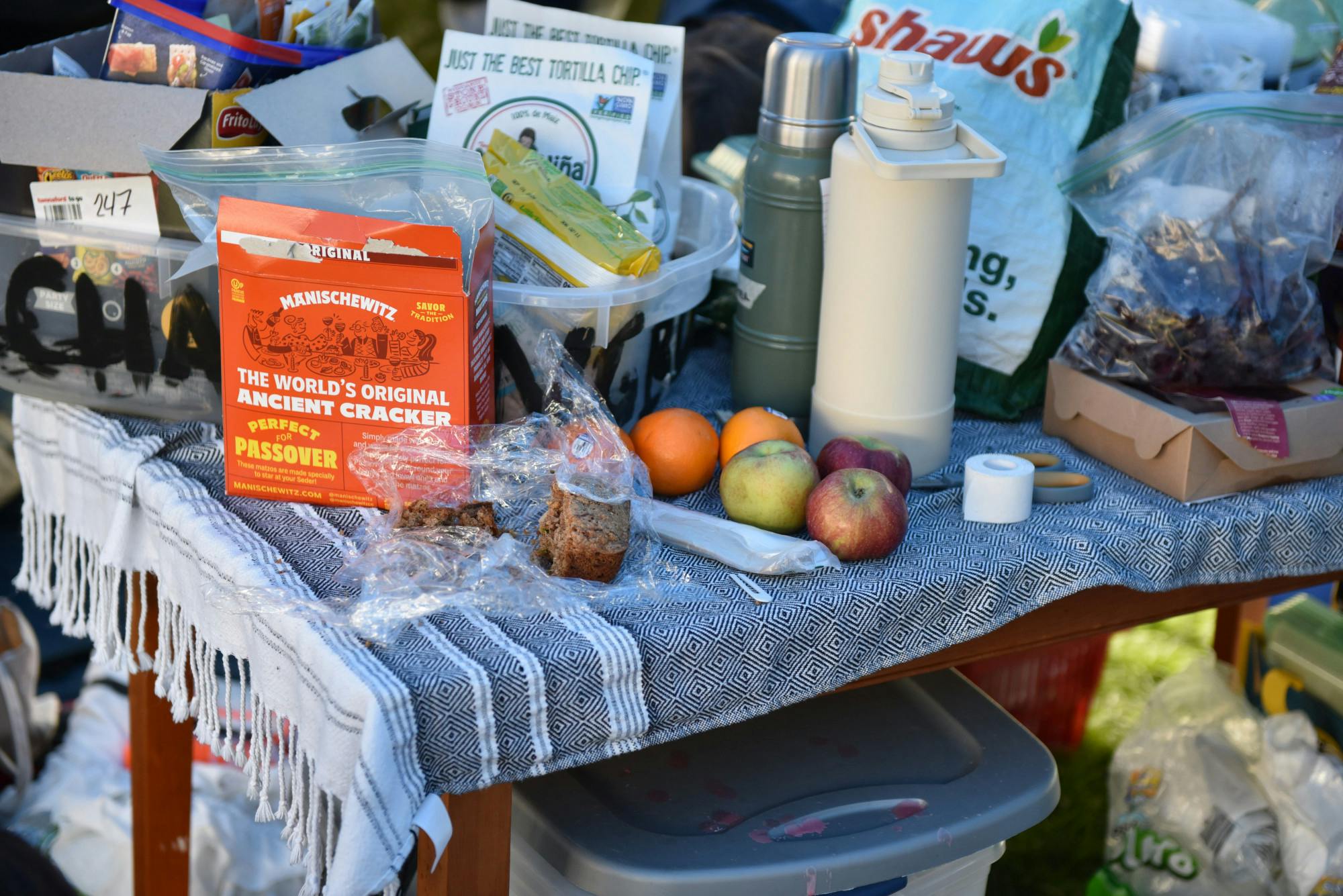
June Su '27 (he/him) is the Senior Multimedia Editor.
June is a political science major and studio art minor, also studying history and Spanish. He spent the summer of 2025 working as a political science research assistant examining investments in the Congo River Basin to achieve international biodiversity and carbon goals.

